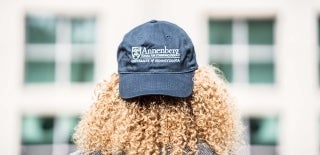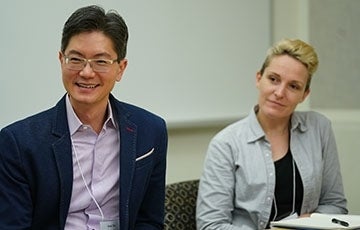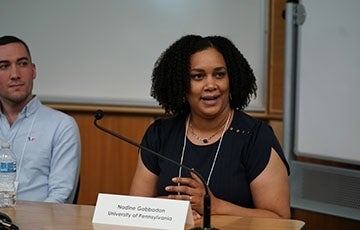
Frequently Asked Questions
Got questions? We've got answers!
Click on the questions below to read the answers to applicants' most frequently asked questions, divided into five categories: financial support, admissions/transfers, the application, standardized testing, and curriculum. If you are unable to find an answer to your question on this page, please contact Rachel Pepper.
We do not offer a standalone master's degree program. The graduate program at Annenberg is designed to prepare students to obtain the Ph.D. While our students do receive a masters of arts, it is a research masters intended to function as a foundation for the doctorate. We educate our students in the theories, substance and methods of communication research and position them to become leading academic and professional positions in the field.
No. Because we fully fund all our students, we can not allow students to attend part-time.
The minimum course requirement for the Ph.D. is 17 courses. All Ph.D. students must take at least one separate course with each of at least five different ASC standing faculty members. The intent of this is to foster students’ knowledge of a diverse range of approaches to communication.
Students with a master’s Degree may request transfer of up to 4 courses. All transfer requests are considered on a case-by-case basis by the student's advisor and the Graduate Studies Committee. Students who receive credit for four transfer courses must complete the remaining 13 courses at the University of Pennsylvania. Transfer credit requests may not be submitted until the student has completed a full academic year at the school.
The normal course load is three courses per term, so students entering with a bachelor's degree will need 3 years (or 6 semesters) to finish their coursework. Students transferring courses can shorten their time in coursework by 1 or 2 semesters. All transfer requests are considered on a case-by-case basis by the student's advisor and the Graduate Studies Committee. Students who receive credit for four transfer courses must complete the remaining 13 courses at the University of Pennsylvania. Transfer credit requests may not be submitted until the student has completed a full academic year at the school. The normal course load is three courses per term, so students entering with a bachelor's degree will need 3 ½ years (or 7 semesters) to finish their coursework. Students transferring courses can shorten their time in coursework by 1 or 2 semesters.
Yes. You may easily take 3-4 courses in other departments. It's possible to take more with the approval of your advisor.
We have currently about 40 students enrolled in classes and an additional 30 working on their dissertations.
Because we fully fund all our students, all students are given the opportunity to work with faculty during their years at ASC through research and teaching fellowships.
Our faculty’s cutting-edge research can be describe by a variety of research areas and those can be futher segmented by topic. You can also visit the profiles of our graduate faculty to get a sense of their work and read some of the stories about student and faculty research.
Prospective students are urged to peruse the Annenberg website for faculty and student work that reflects the continually changing intellectual vibrancy of the School.
All students admitted to the Annenberg School receive the same level of financial support, which includes a stipend, health insurance, and a waiver of University tuition for four years. Funding is contingent upon full-time enrollment, satisfying academic progress, and satisfactory performance as a Teaching or Research Fellow. An fifth year of funding at the same level also is available for dissertation fellowships to support the writing of a dissertation. There is no separate financial aid form for Annenberg applicants. You can read more about our financial support here.
Yes. All students at the Annenberg School are funded at the same level as long as they make satisfactory academic progress.
All students receive $1,000 to cover relocation costs.
Annenberg provides an individual health insurance plan for the student, with the option for the student to purchase insurance through the school for their eligible dependents. The University of Pennsylvania has a family grants students can apply for to help offset the cost of child care, family expenses, and health insurance for dependents.
Students receive an annual budget of $1,700 for research and travel expenses. Students also receive $1,200 for dissertation expenses.
For the academic year (September through May), students may not accept outside employment. Students may work up to 20 hours a week June through August.
Our annual stipend is paid in 12 equal payments and supports projects students work on during the summer.
No. You do not need to have a master’s degree to apply. Roughly 30% of our students come to the program with a previous graduate degree, but the majority do not.
No. Doctoral study at the Annenberg School for Communication is research-intensive and interdisciplinary in nature. Our students come from diverse backgrounds, with undergraduate and graduate degrees in areas such as African-American and American Studies, Cultural Studies, English, History, Film/Media Studies, Journalism, Political Science, Psychology and Sociology, among others.
Yes.
Students with a master's degree may request transfer of up to 4 courses. All transfer requests are considered on a case-by-case basis by the student's advisor and the Graduate Studies Committee. Students who receive credit for 4 transfer courses must complete the remaining 13 courses at the University of Pennsylvania. Transfer credit requests may not be submitted until the student has completed a full academic year (2 semesters) at the school.
We use a wide variety of criteria for admission. The criteria include GREs, GPA, and TOEFL scores (for international candidates); letters of recommendation; and a personal statement. The statement of purpose is very important in the application process because it signals students' research interests and their fit with our doctoral program. No one criterion will allow or disallow admission, as faculty and staff conduct a thorough evaluation of all applications.
Not exactly. A statement of purpose is a narrative that outlines the student’s research interests and provides the student with an opportunity to demonstrate how they would fit in at the Annenberg School for Communication.
Unfortunately, no. Because we fully fund all of our students, we need to make our admissions decisions and admit our next class as a group. Once we begin the evaluation process, we cannot accept additional applications. Therefore, applications received after December 1 cannot be reviewed.
We review all applications in February. You will be notified as soon as possible, but no later than April 1.
Your recommendation letters should come from three persons familiar with your abilities and scholarly work, including, if possible, at least two academics.
No. We have only one admissions cycle per year.
No, they do not.
You will need to resubmit your application, the application fee, and update any portion of your original application that may have changed since the year before.
Unfortunately we are not able to offer tours of the school prior to admitting students. We suggest you visit the school virtually by attending any of our open virtual research events. If you were admitted, these are the types of events you would be attending so it is the best way to get an understanding of what we do.
Also, every admitted candidate to the Annenberg School for Communication is invited to attend our Prospective Student’s Day in March as a guest of the school. The school provides hotel accommodations and covers travel expenses. The program for Prospective Student’s Day is designed to answer all of your questions about the school, the students, faculty and staff. Students meet individually with faculty in their research area, have multiple opportunities to meet with current students in formal and informal surroundings and tour the campus of the University of Pennsylvania.
Yes.
We do not have set requirements for acceptance, but the selection process is highly competitive, so you should do your best to get as high a score as possible.

Learn More About...

Financial Support
Annenberg provides five years of full funding to its Ph.D. students, plus insurance, a travel stipend, and more.

Curriculum & Milestones
Ph.D. students take 20 courses before launching into their dissertation research. Get all the details!

Career & Outcomes
An Annenberg Ph.D. has taken our graduates to prestigious jobs in both academia and private industry.
